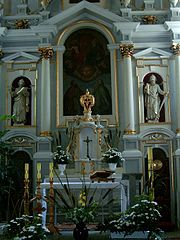
A History Of The Mass And Its Ceremonies In The Eastern And Western Church -Rev John O'Brien A.M.
WINE OF THE ORIENTAL CHURCH
The discipline of the Oriental and the Western Church are in perfect agreement regarding the sacrificial wine. An abuse, however, exists among the Copts which, though not resorted to save in extreme cases, is still deserving of condemnation. We refer to the employment of what is called zebib instead of pure juice of the grape. Pococke, in his Travels in Egypt, art. “The Religion of the Copts,” describes the process of making this very doubtful wine as follows: “In the Catholic churches they must use wine, but in the others they use what they call zebib.… Zebib is a sort of raisin wine. They put five rotolas of new grapes to five of water, or more grapes are used if they are older. It is left to steep seven days in winter and four in summer. The deacons strain it through two bags, one after another, to make it fine. This keeps seven years, and tastes like a sweet wine that is turned a little sour. They keep the zebib in a jar, and cover it closely so that no wind can come to it.” Be all this as it may, the canons of the Coptic Church are very clear and strong upon the point that no other wine but the unadulterated juice of the grape must be used for Mass purposes; and so particular are they that this shall be of the finest quality that they will allow no one to have anything to do with its preparation but the ministers of the altar. To this end the grapes are picked with great care, and are bruised between the hands in extracting the juice from them, instead of being trodden out by the feet, as is the custom when the wine is destined for ordinary use. While the wine remains in the casks it is considered a mortal offence for any one to meddle with it before the quantity necessary for altar uses has first been set aside (Renaudot, vol. i. pp. 176 and 177). The Copts will not say Mass with wine which has been purchased in a store, for the reason that it may not be pure (ibid.)
Copyright ©1999-2023 Wildfire Fellowship, Inc all rights reserved

 Keep Site Running
Keep Site Running